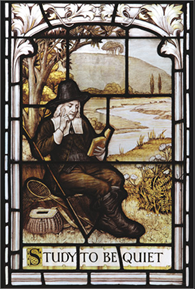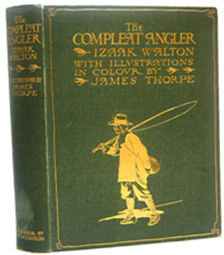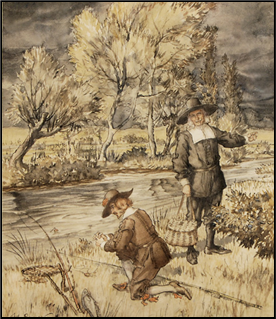


xxxxxThe English biographer Izaak Walton is best known for his The Compleat Angler, a book on the art of fishing, published in 1653. It paints an idyllic picture of an innocent outdoor pursuit, centred around a delightful character named Piscator. He also wrote a number of short biographies, one on the theologian Richard Hooker, but these are not remembered today. The poet John Donne was a close friend and fishing companion. When he died, Walton wrote an Elegy to accompany his volume of poems and later, in 1640, wrote his biography, The Life of Dr.John Donne.
IZAAK WALTON 1593 -
Acknowledgements
Walton: stained glass window in Winchester Cathedral, his place of burial. Compleat Angler: illustration by the English artist Arthur Rackham (1867-
 xxxxxThe English biographer Izaak Walton -
xxxxxThe English biographer Izaak Walton -
xxxxxWalton then went on to write a number of short biographies, notably those of the Elizabethan theologian Richard Hooker (1665), and the English poet George Herbert (1670), another of his fishing companions. These might be seen as first attempts at professional biographies. They were somewhat lightweight in content, not always factually accurate and, as in the style of Plutarch -
 xxxxxFortunately for Walton it did not. His fame, of course, rests fairly and squarely upon his treatise on the art of fishing entitled The Compleat Angler, published in 1653. That this work should become a minor classic -
xxxxxFortunately for Walton it did not. His fame, of course, rests fairly and squarely upon his treatise on the art of fishing entitled The Compleat Angler, published in 1653. That this work should become a minor classic - e would have been more dumbfounded than its author -
e would have been more dumbfounded than its author -
xxxxxA staunch royalist, Walton spent the Civil War in Stafford and, on returning to the south, found a friend in George Morley, the Bishop of Winchester. He took up residence in the bishop's palace and spent the remainder of his days there, writing, reading and, of course, fishing.
xxxxxIncidentally, in a letter to Samuel Coleridge, Charles Lamb wrote that The Compleat Angler “breathes the very spirit of innocence, purity and simplicity of heart”.
CW-


